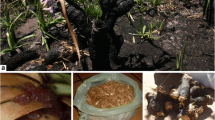Abstract
Kombu is a kind of seaweed growing in northern Japan. In Hidaka District, Hokkaido Island, it comprises an important source of income. In the harvest of wild kombu, competition among the harvesters tends to be intense because of its high price and the fact that it is a limited resource. About a century ago, severe competition caused resource depletion and decline of kombu quality. Today, however, the resource is used sustainably by the villagers, who observe complex communal regulations for the use of common property. This study examines the ecological role of these regulations in the management of kombu as common property, and demonstrates that these regulations facilitate equal access to the resource, maintaining the unity of the local community, as well as efficient resource use.
Similar content being viewed by others
REFERENCES
Acheson, J. M. (1975). The lobster fiefs: Economic and ecological effects of territoriality in the Maine lobster industry. Human Ecology 3: 183-207.
Acheson, J. M. (1989). Management of common property resources. In Plattner, S. (ed.), Econom ic Anthropology. Stanford University Press, Stanford.
Akimichi, T., and Ruddle, K. (1984). The historical development of territorial rights and fishery regulations in Okinawan inshore waters. Senri Ethnological Studies 17: 89-120.
Asada, Y. (1973). License limitation regulations: The Japanese system. Journal of the Fisheries Research Board of Canada 30: 2085-2095.
Bailey, C., and Zerner, C. (1992). Community-based fisheries management institutions in Indonesia. Maritime Anthropological Studies5: 1-17.
Baines, G. B. K. (1989). Traditional resource management in the Melanesian South Pacific: A development dilemma. In Berkes, F. (ed.), Common Property Resources: Ecology and Community-Based Sustainable Development. Belhaven Press, London.
Berkes, F. (1977). Fishery resource use in a subarctic Indian community. Human Ecology 5: 289-307.
Berkes, F. (1985a). Fishermen and the “tragedy of the commons. ” Environmental Conservation 12: 199-206.
Berkes, F. (1985b). The common property resource problem and the creation of limited property rights. Human Ecology 13: 187-208.
Berkes, F. (1986). Local-level management and the commons problem: A comparative study of Turkish coastal fisheries. Marine Policy 10: 215-229.
Berkes, F. (1992). Success and failure in marine coastal fisheries of Turkey. In Feeny, D., et al. (eds.), Making the Commons Work: Theory, Practice, and Policy. ICS Press, San Francisco.
Berkes, F., and Farvar, M. T. (1989). Introduction and overview. In Berkes, F. (ed.), Common Property Resources: Ecology and Community-Based Sustainable Development. Belhaven Press, London.
Erimo-cho (ed.) (1971). History of Erim o-cho. (in Japanese)
Feeny, D., Berkes, F., McCay, B. J., and Acheson, J. M. (1990). The tragedy of the commons: Twenty-two years later. Human Ecology 18: 1-19.
Habara, Y. (1940). History of Capitalism in Kombu Harvest in Japan (in Japanese) Yuhikaku, Tokyo.
Hardin, G. (1968). The tragedy of the commons. Science 162: 1243-1248.
Hoefnagel, E. (1991). Seaweed, status and the symbolic domain: Seaweed harvesters in Portuguese Coastal communities. Maritime Anthropological Studies 4: 40-61.
Hokkaido Suisan-bu Gyogyo-chose i-ka (ed.) (1957). History of Hokkaido Fishery ( in Japanese).
Hokkaido Suisan Kyokai (ed.) (1922). Manuscript for Hokkaido Fishery ( in Japanese ).
Iida, T. (1996). Decision-making on harvesting kombu kelp (Laminaria angustata) in Hidaka District, Hokkaido, Japan. Anthropological Science 101: 65-82.
Johannes, R. E. (1978). Traditional marine conservation methods in Oceania and their demise. Annual Review of Ecology and Systematics 9: 349-364.
Kame yama, K. (1986). Folkloristic Research on the Culture of Fishermen ( in Japanese ). Kobundo, Tokyo.
Kisho-cho (ed.) (1992). Monthly Data on Waves ( in Japanese).
McCay, B. J. (1980). A fishermen's cooperative, limited: Indigenous resource management in a complex society. Anthropological Quarterly 53: 29-38.
McCay, B. J., and Acheson, J. M. (1987). Human ecology of the commons. In McCay, B. J., and Acheson, J. M. (eds.), The Question of the Commons: The Culture and Ecology of Communal Resources. The University of Arizona Press, Tucson.
Miller, D. L. (1989). The evolution of Mexico's Caribbean spiny lobster fishery. In Berkes, F. (ed.), Common Property Resources: Ecology and Community-Based Sustainable Development. Belhaven Press, London.
Oakerson, R. J. (1988). Reciprocity: A bottom-up view of political development. In Ostrom, V., et al. (eds.), Rethinking In stitutional Analysis and Development: Issues, Alternatives, and Choices. ICS Press, San Francisco.
Oakerson, R. J. ( 1992). Analyzing the commons: A framework. In Bromley et al. (eds.), Making the Commons Work: Theory, Practice, and Policy. ICS Press, San Francisco.
Ostrom, E. (1990). Governing the Commons: The Evolution of Institutions for Collective Action. Cambridge University Press, Cambridge.
Ruddle, K. (1989). Solving the common-property dilemma: Village fisheries rights in Japanese coastal waters. In Berkes, F. (ed.), Common Property Resources: Ecology and Community-Based Sustainable Development. Belhaven Press, London.
Warner, G. (1997). Participatory management, popular knowledge and community empowerment: The case of sea urchin harvesting in the Vieux-Fort are a of St. Lucia. Human Ecology 25: 29-46.
Rights and permissions
About this article
Cite this article
Iida, T. Competition and Communal Regulations in the Kombu Kelp (Laminaria angustata) Harvest. Human Ecology 26, 405–423 (1998). https://doi.org/10.1023/A:1018704231913
Issue Date:
DOI: https://doi.org/10.1023/A:1018704231913




